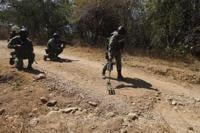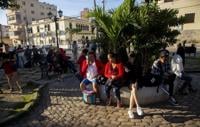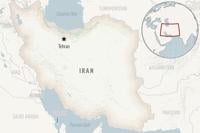MEXICO CITY (AP) — A drug cartel set off a coordinated series of seven roadway bombs in western Mexico that killed four police officers and two civilians, officials said Wednesday. The governor of Jalisco state said the explosions were “a trap” set by the cartel to kill law enforcement personnel.
Luis Méndez, the chief prosecutor of Jalisco state, said the blasts late Tuesday in the township of Tlajomulco were so powerful they left craters in the road, destroyed at least four vehicles and wounded 14 other people.
It appeared to be the first time that a Mexican cartel killed law enforcement personnel with improvised explosive devices, or IEDs, and was the latest example of the , military-style challenge posed by the country’s .
Méndez said the two dead civilians were in a vehicle that happened to be passing the spot when the IEDs detonated in Tlajomulco, near the state capital of Guadalajara. He suggested the bombs may have been remotely detonated, saying the blast “happened at the moment they wanted.”
He said 12 of the wounded were also civilians, including three children ages 9, 13 and 14. He said some of the wounded were in serious condition. Experts had to defuse an eighth IED that did not detonate, and warned the area was still dangerous, Méndez said.
Enrique Alfaro, the governor of , said an anonymous caller who gave a volunteer search group a tip about a clandestine burial site near the roadway set “a trap” for the officers.
For years, police have been unable to locate the more than 110,000 missing people in Mexico, but they accompany volunteer search groups that look for such hidden graves. The volunteers, usually the mothers of missing people, often get anonymous tips about where their relatives may be buried.
Jalisco Gov. Enrique Alfaro said a total of eight “improvised explosive devices” were planted on the roadway.
“This is a brutal terror attack,” Alfaro said at a news conference Wednesday, blaming the deaths on an unnamed drug cartel. He said he was temporarily suspending police escorts for volunteer searches for the safety of the civilians.
Hector Flores, a leader of one of the search groups in Jalisco, said it did not appear that any search volunteers were in the blown up convoy.
“This is an unprecedented act that shows what these drug cartels are capable of,” Alfaro wrote earlier on his social media accounts. “This attack also represents an open challenge to the Mexican government on all levels.”
Alfaro did not say who he suspected of setting the bomb, but the Jalisco drug cartel has significant experience in , as well as bomb-dropping drones. IEDs also wounded 10 soldiers in the neighboring state of Michoacan in 2022 and killed a civilian.
Earlier Tuesday, a federal official acknowledged that another cartel had used a car bomb to in the neighboring state of Guanajuato.
And on Monday in the neighboring state of Guerrero, protesters allied with yet another drug gang battled security forces, commandeered a police armored truck and used it to ram down the gates of the state legislature building.
The area around Guadalajara has seen bloody battles between factions of the Jalisco cartel, which was blamed in the previous use of IEDs in Mexico.
In February 2022, in the Michoacan township of Aguililla, a roadside mine damaged an army vehicle and injured 10 soldiers.
A few days later, another IED killed a farmer when he drove over the device in his pickup truck. The farmer’s son was wounded in the blast, which was apparently fueled by a device containing ammonium nitrate.
Special squads of Mexican army troops equipped with metal detectors and bomb suits were later deployed to the area. Dozens of such devices were found along rural roads and fields in the area around the township of Aguililla.
The IEDs included devices detonated by radio or telephone signal, by pressure — as when someone steps on them — or even by vials that break and combine two chemicals.
The Jalisco cartel has been fighting the local Viagras gang, also known as United Cartels, for control of the area for years. Those battles have featured the use of trenches, pillboxes, homemade armored cars and drones modified to drop small bombs.
The cartels’ bomb-carrying drones have caused more terror in Michoacan than the land mines. While initially crude and dangerous to load and operate — and still worrisomely indiscriminate — drone warfare has improved; it's not unusual to see metal barn or shed roofs opened like tin cans from the impact of drone explosions.
Tuesday's IED attack in Tlajomulco represented a blow for volunteer search groups because they depend on anonymous tips to find mass grave sites. Many times, searchers suspect the tips come from former members of the same cartels that killed their relatives and dumped their bodies.
But the searchers have long operated under an uneasy, non-aggression understanding with the cartels; the volunteer groups stress they are not looking for evidence to prosecute those responsible for kidnapping and killing family members. They say they only want to find the remains, to end their uncertainty and give their relatives a decent burial.
However, six volunteer search activists have been killed in Mexico since 2021. While the motives in those killings remain unclear, activists say the cartels have tried to intimidate searchers, especially if they investigate graves sites that are still being used.








































